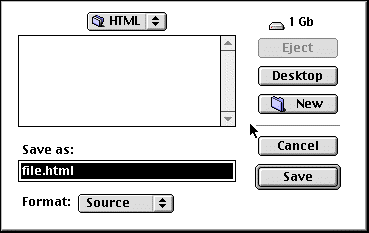
Figure: View HTML Source of a Web Page
There are several good text books on HTML -- see books listing
There are several ONLINE resources that are worth checking out.
HTML Writer's Guild Use URLs
http://www.hwg.org/resources/useful.html
HTML Writer's Guild Use URLs
http://www.hwg.org/resources/html/references.html
Suzanne Cook's Quick Tutorial on Creating Web Pages
(A brief, easy beginner's guide.)
http://cs.weber.edu/tutorial/
Quick Reference for Standard 3.2 (Wilbur)
Kevin Werbach's Barebones Guide to HTML with 3.2 tags
(Also available as a downloadable text file)
http://werbach.com/barebones/
The Official W3C page on Standard 3.2 (Wilbur)
http://www.w3.org/pub/WWW/MarkUp/Wilbur/
The Web Developer's Virtual Library at www.stars.com
(includes browser, server, and CGI references, too)
http://www.stars.com/Vlib/
The Top Ten Mistakes in Web Design (Jacob Nielsen's Alert Box, May 1996)
http://www.useit.com/alertbox/9605.html
The O'Reilly dictionary: very helpful and quite complete dictionary of Internet/Web terms.
http://www.ora.com/reference/dictionary/
And one that's specific to the Web:
World Wide Web Acronym and Abbreviation List:
http://www.ucc.ie/info/net/acronyms/acro.html
HTML Goodies from Joe Burns. The HUH? Tutorials.
Forms, CGI, and a whole lot more
http://www.htmlgoodies.com/
The Best Way to Learn HTML
The best way to learn HTML is by example.
You can read many books but practice, writing your own HTML pages and learning from example WWW pages on line is the best way to learn tips and constructs.
You can use Netscape to help in this matter:

Figure: View HTML Source of a Web Page
Entire Web pages may also be saved to disk by

Figure: Saving HTML Source of a Web Page